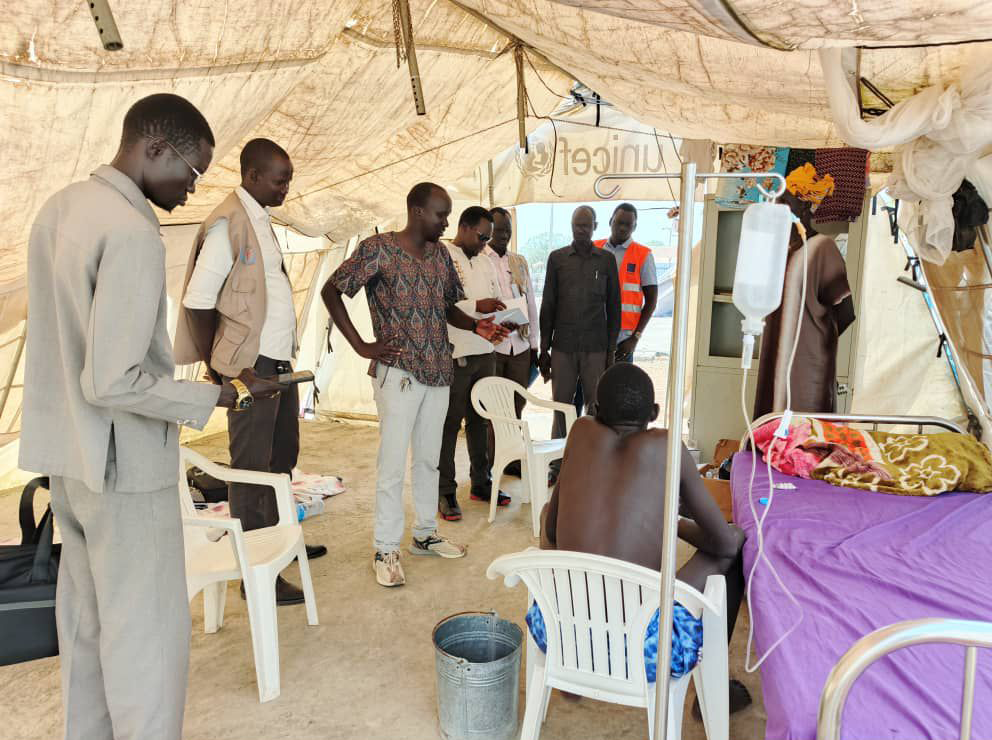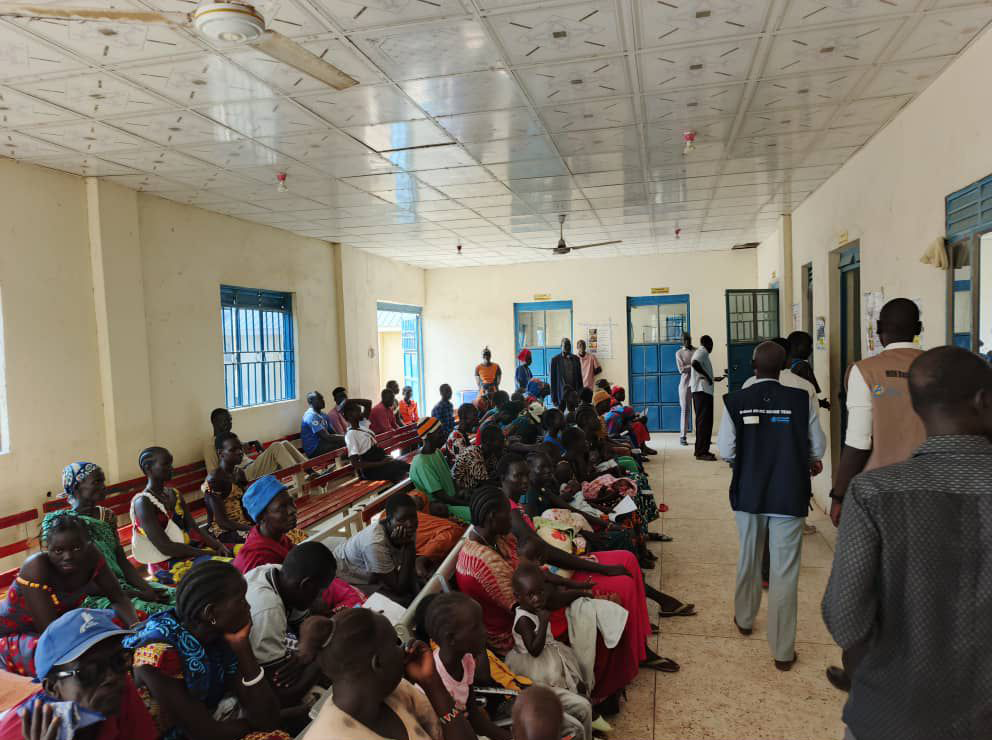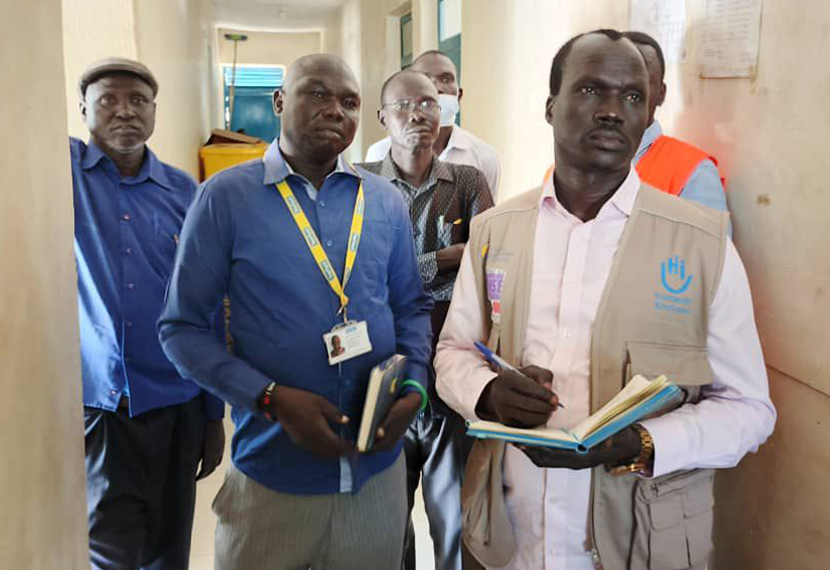We partnered with South Sudan’s Ministry of Health to stop a cholera outbreak in what officials called “the fastest we’ve ever been able to deploy a team”. Thanks to the 7-1-7 target, a dedicated team on high alert for cases and the availability of fast, flexible funds, the Ministry managed to bring the outbreak to an end with six confirmed cases and no reported deaths.
What Happened
On December 10, 2024, a woman arrived at the Pariak Primary Healthcare Centre in Bor, South Sudan, with symptoms including dehydration, vomiting and diarrhea. Her symptoms started the previous day after she returned from a region that was battling a cholera outbreak. Due to many ongoing cholera outbreaks—and widespread flooding affecting large parts of the country—health officials were on high alert for cholera and ready to respond. A surveillance officer recognized the woman’s symptoms, put her in isolation and alerted national health authorities.
Dr. Angelo Goup Thon Kouch, director of health security at South Sudan’s Ministry of Health, was part of the team to receive that alert. “In a place like Bor, a busy urban center with limited clean water and sanitation, cholera can quickly spiral out of control. We had to act quickly to make sure the disease would not claim lives or overwhelm health facilities.” Dr. Angelo quickly notified Dr. Santo Malek Deng, a director general at the Ministry who immediately authorized the deployment of a multisectoral response team, which would include Dr. Angelo.
Cholera is a diarrheal disease that can be fatal within hours if not treated. Cholera is caused by consuming contaminated food or water and is linked to limited access to safe water, basic sanitation facilities and poor hygiene practices.
Every year, an estimated 1.3 to 4 million people get cholera, and 21,000 to 143,000 die.
Most people with cholera have mild or moderate symptoms and can be treated with oral rehydration solution. A minority of patients develop severe acute watery diarrhea and life-threatening dehydration, which can be treated with intravenous fluids, oral rehydration solution and antibiotics.
DETECT
Target: 7 days
NOTIFY
Target: 1 day
RESPOND
Target: 7 days
Date of emergence
December 9, 2024
Date of detection
December 10, 2024
Date of notification
December 10, 2024
Date of early
response
December 19, 2024
The Response
Back in March 2023, South Sudan’s Ministry of Health adopted the 7-1-7 target and became part of the 7-1-7 Alliance, a global group of nations committed to detecting, notifying and responding to outbreaks within seven, one and seven days respectively. Since joining the Alliance, the Ministry has been using the target to great effect—rapidly containing many outbreaks and using each as an opportunity to identify areas for improvement. Just before this outbreak, officials in Bor were trained on 7-1-7, equipping them with a framework to respond quickly.
The team also had access to rapid response funds through an innovative approach developed by Resolve to Save Lives called rapid outbreak financing. Dr. Angelo’s team requested funds to support their response efforts on December 11, one day after the first case was reported. Within 24 hours, the request was approved and funds dispersed by Child Hope, a local NGO. The Ministry was then able to deploy a rapid response team, eight specialists including experts in human, animal and environmental health, who took the next flight to Bor, three days later, on December 15.

The rapid response team meets with staff at a clinic in Bor, South Sudan. Credit: Dr. Angelo Goup Thon Kouch.
What is rapid outbreak financing?
Response team deployments are frequently hampered by a lack of available funding. By the time funds are dispersed to support response efforts, a disease can be left to spread unchecked for weeks or even months. Unlike traditional emergency funds, rapid outbreak financing is designed for speed. The goal is to provide small, flexible amounts of money immediately, allowing local health officials to take action before an outbreak spreads. Even amounts as little as $5,000 have been shown to save hundreds of thousands in costs—saving lives and livelihoods.
Learn more about rapid outbreak financing
The funds allowed the team to purchase essential supplies including rapid diagnostic tests, sample collection kits and personal protective equipment for frontline health workers in Bor, ensuring they could quickly confirm cases and protect themselves. The team also purchased water purification tablets to distribute to the community and risk communication materials to support an outreach campaign engaging community leaders across the wider Bor area.

Patients wait to be seen by staff at a clinic in Bor, South Sudan. Credit: Dr. Angelo Goup Thon Kouch.
On December 16, the team visited the health facility in Bor to provide supplies, investigate the source of the outbreak and initiate contact tracing efforts. The team identified five additional cases—all from the woman’s family—who were admitted to hospital, isolated and treated. The team also joined local health workers to identify potential new cases while providing supplies to and educating the local community. No further infections were detected, and the outbreak was stopped at six cases with no recorded deaths by the time the final response action, establishing a coordination mechanism, was completed on December 19.
Dr. Angelo called the response a breakthrough. “This is the fastest we’ve ever been able to deploy a team,” he said. “Thanks to surveillance officers being on high alert and the use of 7-1-7 and rapid outbreak financing, we could quickly contain this outbreak. Other cholera outbreaks in South Sudan have many more cases when teams cannot act quickly.” In contrast to this response, a recent outbreak in Rubkona, just 150 kilometers north of Bor, lasted for seven months. It eventually ended with 424 cases and one reported death.
“This is the fastest we’ve ever been able to deploy a team…Thanks to 7-1-7 and rapid outbreak financing, we could act quickly to contain this outbreak. Other cholera outbreaks in South Sudan have many more cases when teams cannot act quickly.”
Ultimately, the response only narrowly missed the 7-1-7 target. Although the case was detected and reported in one day, the team’s early response actions took 9 days to complete, which included three days waiting for weather conditions in Bor to improve enough for flights to land. Despite the travel delays, the response highlights how advance preparation can make a swift response possible: Dr. Angelo’s team was on high alert for cases, equipped with a framework to respond quickly and empowered with rapid response funds to do so.
Despite this success, South Sudan’s health system remains vulnerable. The recent U.S. government funding pause has left emergency operations centers without basic resources. “The funding freezes have greatly disrupted our work and ability to be effective. It is difficult to provide routine health services and some health care workers are even exiting the field.”
Against a backdrop of government funding pauses, and with ongoing outbreaks of cholera and other diseases, tools like 7-1-7 and rapid response funds could be the difference between containment and catastrophe. While they can’t replace the full suite of resources made possible through international aid, these tools at least provide mechanisms for health officials to act quickly in a crisis. The outbreak in Bor could have been a disaster but instead became an example demonstrating the power of readiness and early, flexible funding.
Enablers

High clinical suspicion to detect cases

Availability of early response funding

